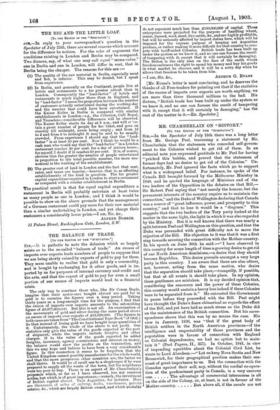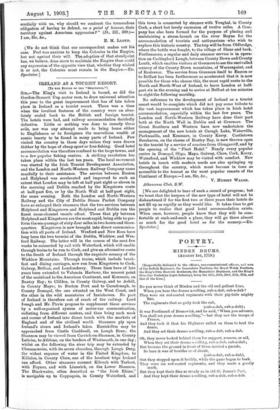MR. CHAMBERLAIN ON "HISTORY."
[To THE EDITOR OF THE "SPECTATOR."] SIR,—In the Spectator of July 18th tbere was a long letter from Mr. George Peel, traversing a statement by Mr.
Chamberlain that the statesmen who conceded self-govern.
went to the Colonies wished to get rid of them. In an editorial note you expressed gratitude to Mr. Peel for having "pricked this bubble, and proved that the statesmen of former days had no desire to get rid of the Colonies." Un- fortunately, Mr. Peel ignored the facts which go to support what is a widespread belief. For instance, he spoke of the Canada Bill brought forward by the Melbourne Ministry in 1840, and he quoted the language of Ministers and of the two leaders of the Opposition in the debates on that Bill,— Sir Robert Peel saying that "not merely the honour, but the permanent interests of the country require us to maintain the connection," and the Duke of Wellington declaring that Canada was a source of "great influence, power, and prosperity to this country," and that to lose it would be a "disgrace." This suggests that the two leaders of the Tory party looked at the matter in the same light, the light in which it was also regarded by the Ministry. But it is well known that there was nearly a split between Peel and Wellington on this question, and that the Duke was persuaded with great difficulty not to move the rejection of the Bill. His objection to it was that it was a first step towards severing the connection with the Mother-country. In his speech on June 30th he said :—" I have observed in this country for some length of time a growing desire to get rid of our North American dominions,-'--a desire that they should become Republics. This desire prevails amongst a very large party in this country. I am aware that there are also others, not, however, acting from the same motive, who desire that the separation should take place,—tranquilly, if possible, but that at 0.11 events it should take place. In my opinion, these gentlemen are mistaken. It is my decided opinion that, considering the resources and the power of these Colonies, this country would sustain a heavy loss indeed if these Colonies were to be separated from it." He entreated the Government to pause before they proceeded with the Bill. Peel might have thought the Duke's fears chimerical as regards the effect of the Bill, and yet have laid as much stress as the Duke did on the maintenance of the British connection. But his corre- spondence shows that this was by no means the case. His view in January, 1838, was "that if the great body of British settlers in the North American provinces—if the intelligence and respectability of those provinces and the population were in favour of connection with England as Colonial dependencies, we had no option but to main- tain it" (Peel Papers, II., 357). In October, 1841, in view of impending squabbles about the Colonial Civil List, he wrote to Lord Aberdeen:—" Let us keep Nova Scotia and New Brunswick, for their geographical position makes their sea- coast of great importance to us. But the connection with the Canadas against their will, nay, without the cordial co-opera- tion of the predominant party in Canada, is a very onerous one The advantage of commercial intercourse is all on the side of the Colony, or, at least, is not in favour of the
Mother-country But above all, if the -people are not cordially with us, why should we contract the tremendous obligation of having to defend, on a point of honour, their territory against American aggression ? " (lb., III., 389.)-
I am, Sir, &c., E. M. LLOYD.
We do not think that our correspondent makes out his case. Peel was anxious to keep the Colonies in the Empire, but not against their will. Thtadoption of that standpoint has, we believe, done more to maintain the Empire than could
any expression of the opposite view that, whether they wished it or not, the Colonies must remain in the Empire.—En. Spectator.]







































 Previous page
Previous page